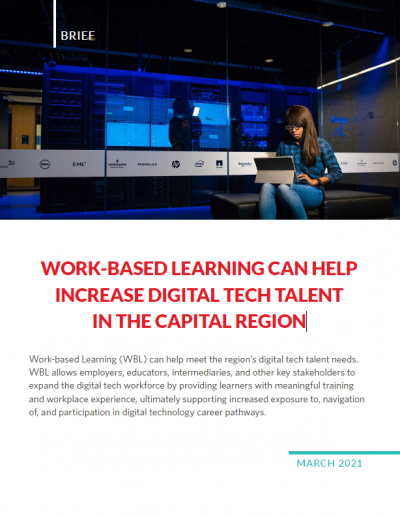Work-Based Learning Can Help Increase Digital Tech Talent in the Capital Region
Publish Date: March 2021

 Download Issue Brief »
Download Issue Brief »
The CoLAB partnered with HEI to conduct a landscape analysis of digital tech WBL efforts in the Capital Region. The scan focused on identifying the spectrum of WBL models implemented, WBL platforms and tools utilized, promising practices guiding the design and delivery of quality WBL, and key WBL stakeholders throughout the region. Integral to this work was understanding practices that increased representation of learners among populations historically excluded from digital tech, and subsequently, identifying strategies that contribute efficaciously to equitable WBL opportunity and outcomes. The CoLAB’s current involvement in the digital tech talent pipeline includes offering digital technology internships that connect secondary and post-secondary students to member employers, as well as a digital technology credentialing program that seeks to help emerging professionals gain in-demand tech capabilities sought by employers. Ultimately, the purpose of the scan was to help CoLAB define a strategy for its participation in scaling high-quality, equitable WBL both internally and region-wide.
The CoLAB partnered with HEI to conduct a landscape analysis of digital tech WBL efforts in the Capital Region. The scan focused on identifying the spectrum of WBL models implemented, WBL platforms and tools utilized, promising practices guiding the design and delivery of quality WBL, and key WBL stakeholders throughout the region. Integral to this work was understanding practices that increased representation of learners among populations historically excluded from digital tech, and subsequently, identifying strategies that contribute efficaciously to equitable WBL opportunity and outcomes. The CoLAB’s current involvement in the digital tech talent pipeline includes offering digital technology internships that connect secondary and post-secondary students to member employers, as well as a digital technology credentialing program that seeks to help emerging professionals gain in-demand tech capabilities sought by employers. Ultimately, the purpose of the scan was to help CoLAB define a strategy for its participation in scaling high-quality, equitable WBL both internally and region-wide.
Several key federal legislations provide context for and also align with CoLAB’s focus on WBL in digital technology: the Strengthening Career and Technical Education for the 21st Century Act (Perkins V), Every Student Succeeds Act of 2015 (ESSA), and the Workforce Innovation and Opportunity Act of 2014 (WIOA). Perkins V provides funding for Career and Technical Education (CTE) programs, within which WBL activities are often a core component. In particular, Perkins V funds efforts to prepare students for occupations that are high skill, high wage, and/or high demand. Information/digital technology meets all three of these requisites in the Capital Region. ESSA funds WBL experiences in schools where students can earn academic credit for participation and WBL administrators can receive professional development. Lastly, WIOA funding can be used to support employers in providing WBL experiences to learners with disabilities.
The CoLAB believes that increasing the presence of quality, equitable WBL across the Capital Region is critical to expanding the region’s digital tech talent pipeline. Based on its market analysis, the CoLAB predicts that almost 60,000 annual positions will go unfilled by 2025 if the tech talent pipeline is not expanded. The CoLAB recognizes that collaboration with other WBL stakeholders is necessary to accomplish this goal.
CoLAB is confident that much of the talent needed to close the gap is right here in the region. By working with other stakeholders to ensure that secondary and postsecondary students throughout the region have access to high-quality WBL experiences, CoLAB can help close this gap.